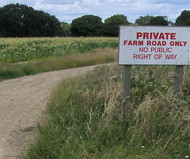11/22/2016
West Virginia Supreme Court Expands DUI To Private PropertyHigh court in West Virginia declares drunk driving laws even apply to roads that are not open to the public.

West Virginians can be charged with drunk driving on their own private land, even if they represent no danger to others. The state Supreme Court of Appeals laid down this new precedent last month, overturning previous interpretations of the state's driving under the influence (DUI) law.
"We hold that an individual may lose his/her driver's license if they are found driving a vehicle anywhere within the physical boundaries of West Virginia while under the influence of alcohol (and/or drugs), even if the vehicle is driven only upon private property not open to the general public," Chief Justice Menis E. Ketchum II wrote for the court.
The ruling does not just apply to automobiles driven on one's own land. The high court reviewed the situation of Joshua D. Beckett, who was arrested on February 4, 2012 for riding an all-terrain vehicle on his family's farm in Monroe County. Having had a bit too much to drink, Beckett crashed his ATV and a friend called 911 for help. The medical personnel who responded to the scene called the sheriff after noticing Beckett was tipsy and had a blood alcohol level of .17.
A magistrate threw out the aggravated DUI charge against Beckett, but the state Division of Motor Vehicles (DMV) suspended his license anyway. Beckett sued to block the suspension on the grounds that he never once drove on a public road while drunk and the DMV has no jurisdiction over private property. A circuit court judge agreed, citing the 1980 state Supreme Court ruling West Virginia v. Ball. The high court justices, however, decided that the Ball ruling was incorrect and substituted a new interpretation of the DUI statute as criminalizing the act drunk driving "in this state" -- without qualification.
"The legislature chose to structure our DUI statutes to regulate the condition of the driver, not the locale in which the driving is taking place," Justice Ketchum wrote. "Thus, the legislature expressed its plain intent to prohibit an intoxicated person from driving a vehicle anywhere in West Virginia, whether on public roads or across private land."
A copy of the ruling is available in a 70k PDF file at the source link below.


